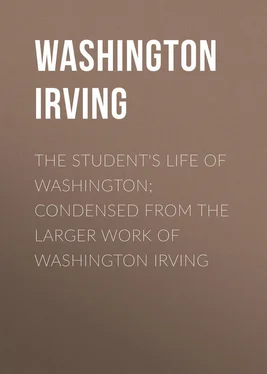Washington Irving - The Student's Life of Washington; Condensed from the Larger Work of Washington Irving
Здесь есть возможность читать онлайн «Washington Irving - The Student's Life of Washington; Condensed from the Larger Work of Washington Irving» — ознакомительный отрывок электронной книги совершенно бесплатно, а после прочтения отрывка купить полную версию. В некоторых случаях можно слушать аудио, скачать через торрент в формате fb2 и присутствует краткое содержание. Издательство: Иностранный паблик, Жанр: literature_19, foreign_antique, foreign_prose, на английском языке. Описание произведения, (предисловие) а так же отзывы посетителей доступны на портале библиотеки ЛибКат.
- Название:The Student's Life of Washington; Condensed from the Larger Work of Washington Irving
- Автор:
- Издательство:Иностранный паблик
- Жанр:
- Год:неизвестен
- ISBN:нет данных
- Рейтинг книги:3 / 5. Голосов: 1
-
Избранное:Добавить в избранное
- Отзывы:
-
Ваша оценка:
- 60
- 1
- 2
- 3
- 4
- 5
The Student's Life of Washington; Condensed from the Larger Work of Washington Irving: краткое содержание, описание и аннотация
Предлагаем к чтению аннотацию, описание, краткое содержание или предисловие (зависит от того, что написал сам автор книги «The Student's Life of Washington; Condensed from the Larger Work of Washington Irving»). Если вы не нашли необходимую информацию о книге — напишите в комментариях, мы постараемся отыскать её.
The Student's Life of Washington; Condensed from the Larger Work of Washington Irving — читать онлайн ознакомительный отрывок
Ниже представлен текст книги, разбитый по страницам. Система сохранения места последней прочитанной страницы, позволяет с удобством читать онлайн бесплатно книгу «The Student's Life of Washington; Condensed from the Larger Work of Washington Irving», без необходимости каждый раз заново искать на чём Вы остановились. Поставьте закладку, и сможете в любой момент перейти на страницу, на которой закончили чтение.
Интервал:
Закладка:
Braddock was a veteran in service, and had been upwards of forty years in the guards, that school of exact discipline and technical punctilio. He was a brave and experienced officer; but his experience was that of routine, and rendered him pragmatical and obstinate, impatient of novel expedients, and his military precision, which would have been brilliant on parade, was a constant obstacle to alert action in the wilderness. He was to lead in person the grand enterprise of the campaign, that destined for the frontiers of Virginia and Pennsylvania; it was the enterprise in which Washington became enlisted, and, therefore, claims our especial attention.
Prior to the arrival of Braddock, came out from England Lieutenant-Colonel Sir John St. Clair, deputy quartermaster-general, eager to make himself acquainted with the field of operations. He made a tour of inspection, in company with Governor Sharpe, of Maryland, and appears to have been dismayed at sight of the impracticable wilderness, the region of Washington's campaign. From Fort Cumberland, he wrote in February to Governor Morris, of Pennsylvania, to have the road cut, or repaired, toward the head of the river Youghiogeny, and another opened from Philadelphia for the transportation of supplies. Unfortunately the governor of Pennsylvania had no money at his command, and was obliged, for expenses, to apply to his Assembly, "a set of men," writes he, "quite unacquainted with every kind of military service and exceedingly unwilling to part with money on any terms." However, by dint of exertions, he procured the appointment of commissioners to explore the country, and survey and lay out the roads required. At the head of the commission was George Croghan, the Indian trader, whose mission to the Twightwees we have already spoken of.
When Sir John St. Clair had finished his tour of inspection he descended Wills' Creek and the Potomac for two hundred miles in a canoe to Alexandria, and repaired to Virginia to meet General Braddock. The latter had landed on the 20th of February, at Hampton, in Virginia, and proceeded to Williamsburg to consult with Governor Dinwiddie. Shortly afterwards he was joined there by Commodore Keppel, whose squadron of two ships-of-war, and several transports, had anchored in the Chesapeake. On board of these ships were two prime regiments of about five hundred men each – one commanded by Sir Peter Halket, the other by Colonel Dunbar; together with a train of artillery, and the necessary munitions of war. The regiments were to be augmented to seven hundred men, each by men selected by Sir John St. Clair from Virginia companies recently raised. Alexandria was fixed upon as the place where the troops should disembark and encamp. The ships were accordingly ordered up to that place, and the levies directed to repair thither.
The plan of the campaign included the use of Indian allies. Governor Dinwiddie had already sent Christopher Gist to engage the Cherokees and Catawbas, the bravest of the Southern tribes, who he had no doubt would take up the hatchet for the English, peace being first concluded, through the mediation of his government, between them and the Six Nations; and he gave Braddock reason to expect at least four hundred Indians to join him at Fort Cumberland. General Braddock apprehended difficulty in procuring wagons and horses sufficient to attend him in his march. Sir John St. Clair, in the course of his tour of inspection, had met with two Dutch settlers, at the foot of the Blue Ridge, who engaged to furnish two hundred wagons and fifteen hundred carrying horses, to be at Fort Cumberland early in May. Governor Sharpe was to furnish above a hundred wagons for the transportation of stores, on the Maryland side of the Potomac. Keppel furnished four cannons from his ships, for the attack on Fort Duquesne, and thirty picked seamen to assist in dragging them over the mountains. They were to aid also in passing the troops and artillery on floats or in boats, across the rivers, and were under the command of a midshipman and lieutenant.
Trusting to these arrangements, Braddock proceeded to Alexandria. The troops had all been disembarked before his arrival, and the Virginia levies, selected by Sir John St. Clair to join the regiments of regulars, were arrived. There were beside two companies of hatchet men, or carpenters, six of rangers, and one troop of light horse. The levies, having been clothed, were ordered to march immediately for Winchester to be armed. The light horse were retained by the general as his escort and body guard.
The din and stir of warlike preparation disturbed the quiet of Mount Vernon. Washington looked down from his rural retreat upon the ships of war and transports as they passed up the Potomac, with the array of arms gleaming along their decks. The booming of cannon echoed among his groves. Alexandria was but a few miles distant. Occasionally he mounted his horse, and rode to that place; it was like a garrisoned town, teeming with troops, and resounding with the drum and fife. A brilliant campaign was about to open under the auspices of an experienced general, and with all the means and appurtenances of European warfare. How different from the starveling expeditions he had hitherto been doomed to conduct! What an opportunity to efface the memory of his recent disaster! All his thoughts of rural life were put to flight. The military part of his character was again in the ascendant; his great desire was to join the expedition as a volunteer. It was reported to General Braddock. The latter was apprised by Governor Dinwiddie, and others, of Washington's personal merits, his knowledge of the country, and his experience in frontier service. The consequence was a letter from Captain Robert Orme, one of Braddock's aides-de-camp, written by the general's order, inviting Washington to join his staff.
A volunteer situation on the staff of General Braddock offered no emolument nor command, and would be attended with considerable expense, still he did not hesitate a moment to accept the invitation. In the position offered to him, all the questions of military rank which had hitherto annoyed him would be obviated, and he could indulge his passion for arms without any sacrifice of dignity. His arrival at head-quarters was hailed by his young associates, Captains Orme and Morris, the general's aides-de-camp, who at once received him into frank companionship, and a cordial intimacy commenced between them that continued throughout the campaign. He experienced a courteous reception from the general, who expressed in flattering terms the impression he had received of his merits.
There were at that time four governors, beside Dinwiddie, assembled at Alexandria, at Braddock's request, to concert a plan of military operations – Governor Shirley, of Massachusetts; Lieutenant-Governor Delancey, of New York; Lieutenant-Governor Sharpe, of Maryland; Lieutenant-Governor Morris, of Pennsylvania. Washington was presented to them in a manner that showed how well his merits were already appreciated.
A grand council was held on the 14th of April, composed of General Braddock, Commodore Keppel, and the governors. In discussing the campaign, the governors were of opinion that New York should be made the centre of operations, as it afforded easy access by water to the heart of the French possessions in Canada. Braddock, however, did not feel at liberty to depart from his instructions, which specified the recent establishments of the French on the Ohio as the objects of his expedition.
Niagara and Crown Point were to be attacked about the same time with Fort Duquesne, the former by Governor Shirley, with his own and Sir William Pepperell's regiments, and some New York companies; the latter by Colonel William Johnson, sole manager and director of Indian affairs – a personage worthy of especial note. He was a native of Ireland, and had come out to this country in 1734 to manage the landed estates owned by his uncle, Commodore Sir Peter Warren, in the Mohawk country. By his agency and his dealings with the native tribes, he had acquired great wealth, and become a kind of potentate in the Indian country. His influence over the Six Nations was said to be unbounded.
Читать дальшеИнтервал:
Закладка:
Похожие книги на «The Student's Life of Washington; Condensed from the Larger Work of Washington Irving»
Представляем Вашему вниманию похожие книги на «The Student's Life of Washington; Condensed from the Larger Work of Washington Irving» списком для выбора. Мы отобрали схожую по названию и смыслу литературу в надежде предоставить читателям больше вариантов отыскать новые, интересные, ещё непрочитанные произведения.
Обсуждение, отзывы о книге «The Student's Life of Washington; Condensed from the Larger Work of Washington Irving» и просто собственные мнения читателей. Оставьте ваши комментарии, напишите, что Вы думаете о произведении, его смысле или главных героях. Укажите что конкретно понравилось, а что нет, и почему Вы так считаете.












